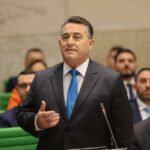
Britain’s Parliament will attempt to defy Prime Minister Boris Johnson’s Brexit plans on Wednesday as lawmakers seek a way out of the impasse that has gripped the nation since the 2016 vote to leave the European Union.
The House of Commons is confronting Johnson over his insistence that the U.K. leave the EU on Oct. 31 even without a withdrawal agreement to cushion the economic blow. On Wednesday, it will consider a measure that will try to block a departure without a deal, amid cries from lawmakers that a no-deal Brexit will cause irreparable harm.
“To deliver Brexit like this is to create a poison pill which for 40 years will divide this country straight down the middle,” former Conservative Party leadership candidate Rory Stewart told the BBC. “If you are going to deliver Brexit at all, try to do it legally, constitutionally and with consent.”
Johnson has said he will seek a general election if the lawmakers succeed this week, taking his message directly to the people in his bid to deliver Brexit, come what may. But it is unclear whether he will have the votes for such a move.
The main opposition Labour Party has signaled it will oppose an election until legislation is in place to block the no-deal exit.
In a maneuver to try to limit debate on the measure, Johnson has moved to cut short Parliament’s session — giving lawmakers only a few days to pass the no-deal measure.
The U.K. leader received a boost Wednesday when a Scottish court refused to intervene in his decision to suspend Parliament. It is the first of several challenges to Johnson’s maneuver.
Transparency campaigner Gina Miller, who won a ruling in the Supreme Court in 2017 that stopped the government from triggering the countdown to Brexit without a vote in Parliament, has another legal challenge in the works — set to be heard Thursday. A human rights campaigner has sued in Northern Ireland, arguing that the historic Good Friday accord that brought peace is in jeopardy because of Johnson’s actions.
On Tuesday, Johnson lost his first vote in Parliament since becoming prime minister in July and has been hurt by defections from his party that cost him his working majority.
Further weakening his grip on power, Johnson cracked down on members of his Conservative Party who opposed his Brexit plans, expelling them from the Tories for supporting parliamentary efforts to block or delay the withdrawal.
Among those bounced out were Stewart; Nicholas Soames, the grandson of Winston Churchill; and Kenneth Clarke, a former treasury chief and the longest-serving member of the House of Commons.







